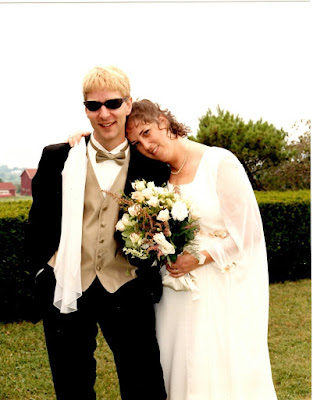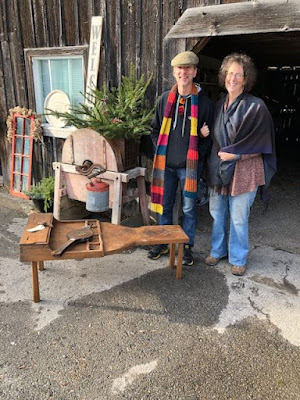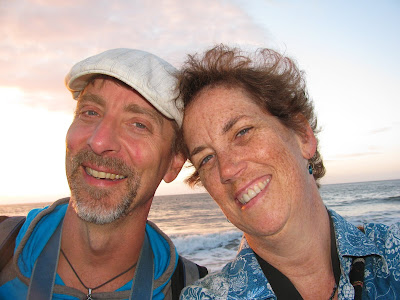My mother was born Marguerite Thérèse Ayo in the little town of Schriever, Louisiana, on August 10, 1920, exactly a hundred years ago. She was the middle of three children. Her father was an insurance salesman, a kind, soft-spoken man who was absent from the home a good bit of the time. Her mother -- typical of the time -- was a stay-at-home mom, and from what I've heard was an exacting, demanding woman who expected her children to be perfect.
Left to right: my aunt Florence, my grandmother (Flora (Meyer-Lévy) Ayo), my uncle Sidney, and my mom.
The photograph above speaks volumes. According to my mother, when the film was developed, Florence was the only one who met with approval. Sidney's belt end had flopped down and my mom's stockings were wrinkled at the knees, something they heard about every time my grandmother looked at this photograph. My mom had a bad case of middle-child syndrome -- her older sister was the picture of etiquette and academic success, and her younger brother got away with murder because he was the youngest and the only boy. My mom never felt like she could measure up.
My mom at about 12
Historian Arnold Toynbee famously said "Life is just one damned thing after another," and that was certainly true in my mom's case. When I think of what happened to her over her more than eight decades of life, what strikes me is that she got knocked down again and again by circumstances outside her control. As I mentioned, she never got much approval from either parent. When she was 17, her mother had a stroke at the young age of 44, and it changed her already difficult personality for the worse -- now she was largely housebound, had difficulty walking and talking, and found fault with everything and everyone.
My mom, age around 18
My mom escaped by marrying my dad, then a private in the Marine Corps. It was the first years of World War II and my dad ended up stationed in Hawaii (in fact, they were in Honolulu and heard the bombs striking Pearl Harbor). In 1945 my sister Margaret Mary was born -- but she was premature and had Rh-incompatibility syndrome, then a dire and life-threatening emergency, and only lived nine days.
My grandmother had a second stroke and died shortly after the war ended. My parents had neither the resources nor the opportunity to return to Louisiana for the funeral, and in traditional Cajun culture, not going to a close relative's funeral is about as disrespectful as you can get. Everyone said they understood, but my mom never forgave herself.
My mom shortly after the end of the war
Over the next decade, my dad was bounced around from military base to military base. For three years, in the 1950s, he lived on a base in Japan. Left alone at home, my mom did the best she could, and that was when she found her true passion -- art. She learned painting, sculpture, and (especially) ceramics, and created some amazing works in porcelain. Here's one of her bone china dolls:
The lace itself is made of bone china. Don't ask me how she did it.
My parents wanted children, and after the loss of my sister, they tried. No luck. Doctors' visits showed nothing physically wrong with either one, but no success. Fifteen years after my sister's death, my mom was forty years old and had resigned herself to being childless. She was preparing to throw herself into becoming a full-time studio artist...
... when I came along.
Me and my mom, June of 1961
I won't say I wasn't wanted; but when my parents said I was their "mistake," it was only half kidding. I busted up my mother's plans of being a full-time artist without even knowing I'd done it. Then in late 1961, shortly after this photo was taken, my dad got transferred -- to Reykjavík, Iceland. Back then enlisted men couldn't bring their families along to most overseas assignments, so for two years my mom and I only saw my dad when he was on furlough. She and I moved in with her father, who had by then remarried.
Imagine it. You're a forty-year-old with your only child, and you have to move back to your father's house and live with him and with a stepmother whom you frankly detest. Once again, fate had given her a good gut punch.
This is where it gets complicated, because my mom honestly tried to jump into her new role as mother as well as she could. But our relationship was fractious pretty much from the beginning. I was about as opposite to her picture of "the perfect son" as it's possible to be. She wanted a tough, independent, all-American boy, who was a solid-B student and played baseball and went fishing and hunting on the weekend. She got me -- a bookish, nearsighted, sensitive dreamer who wanted to spend his time reading and making up stories, who hated team sports with a passion and whose idea of athletics was going on a solo five-mile run. Despite my being reasonably smart, she couldn't even brag about my academic prowess -- my grades yo-yoed all over the place, depending on whether I liked the teacher and whether during that grading period I'd focused on learning about the Franco-Prussian War instead of inventing characters to send on adventures in time and space.
Plus, there was the problem that she and I never honestly understood each other, not on any kind of deep level. She was a devout Roman Catholic; I was a doubter pretty much the moment I was old enough to consider the question. She had an innate respect for authority; my general attitude toward authority was "either earn my respect, or go to hell." She was a staunch conservative; I was born leaning to the left. She liked everything in black-and-white -- people were good or bad, a thing was true or not, an action was right or it was wrong. Me, I saw (and still see) pretty much everything in shades of gray.
It was almost like she and I didn't speak the same language.
My dad was stationed for a time in Charleston, West Virginia, and we lived in the town of St. Albans, where my mom met a neighbor named Garnett Mudd, the woman my mom called "the only real friend I ever had." They were kindred spirits, especially in their love of gardening, and I remember Garnett as being a wise and gentle person with wide-ranging knowledge and a brilliant sense of humor. Then -- my parents got transferred again, and they had to leave West Virginia. And as if this wasn't bad enough, six months after they moved away, Garnett was walking home from the school where she taught and died of a massive heart attack at the age of 57.
And once again, my mom's world closed in on her a little more.
My dad retired in 1967 and we moved back to his home town of Lafayette, Louisiana. For a year I lived with my paternal grandmother -- ostensibly because they were in the process of building a house and the little room they rented didn't have space for me, but I think honestly it was mostly because my mom was having trouble dealing with me. This led to another fractious relationship -- between my mom and her mother-in-law. In retrospect, I have to admit my paternal grandmother wasn't an easy person. I idolized her, but she and my mom never got along -- as far as I've heard, right from the start. The fact that I preferred being with my grandmother has to have rankled. Whatever the cause, pretty much every time they were together, there was an argument, and no matter how petty the cause, neither one would ever give the other an inch.
It was during this time that my mom developed rheumatoid arthritis, a horrible disease that gradually robbed her of her mobility, and worse, of her ability to use her hands. Her art became less a joy than a painful frustration. I remember her during my teenage years as being in perpetual pain. By then, we were at continual loggerheads over just about everything. So on top of the usual teenage angst, stubbornness, and rebellion, there was a good dose of spite in my behavior -- of my doing things deliberately to set her off.
You'd think she'd have looked forward to my moving out, but when I was looking at colleges, my parents were adamant that I attend the University of Louisiana, in my home town, live at home rather than in the dorms, and commute. Considering my attitude, to this day I don't know why they didn't hand me my suitcase and say "good riddance" to me. I also don't know why I didn't push harder to move away. Having space from each other would have done all of us a world of good, I think. But she pressed, and I caved, and in what I think is one of the worst personal mistakes I've ever made, I stayed at home while going to college. During a time when most people are dating, partying, and forming friendships, I had a nearly zero social life. I had some friends I saw at school; but after class was over, I went home and stayed home. And still my mom and I frayed each other on a daily basis.
I finally moved away after graduation in 1982, because I'd met the woman who would become my first wife. It is not an exaggeration to say that my mom and Anne loathed each other. My mom, who prided herself on following the rules of etiquette, could barely say a polite word to Anne about anything. To be fair, Anne was far from blameless herself; my first marriage was, in a word, a mistake, which is another topic in and of itself. But by that time I was desperate to get out, and Anne was my ticket -- to her home town of Seattle, Washington.
Visits home were few, tense, and as short as we could make them for propriety's sake. From the outside, everything probably looked hunky-dory -- my mom told friends and neighbors about her pride when I got my teaching license and landed my first full-time teaching position, then when my two sons were born. But the fact remained that we just didn't understand each other, and conversations were like walking in a minefield. By this time we were usually able to avoid arguments, largely because we rarely talked about anything more meaningful than how the boys were doing and how my job was going.
Ultimately Anne and I divorced, and a few years later, I remarried to Carol, two of the only things I've ever done that met with my mom's 100% unequivocal approval. (I still recall that when Carol and I were dating, in 2001, she had a business trip that would take her through Lafayette, and she bravely arranged to visit my parents. I was a nervous wreck until the visit was over -- but to Carol's credit and my complete shock, it was a resounding success.) My dad died of a stroke on July 4, 2004, and my mom followed eight months later, on February 19, 2005.
My mom with her two grandsons in the Blue Dog Café, Lafayette, Louisiana, in December 2004, three months before her death at age 84
Thinking about my mother on what would be her hundredth birthday, I'm experiencing mixed emotions. I feel sorry for all the adversity she faced during her life -- it seemed like fate dealt her blow after blow, and as soon as she stood up from one knockdown, she was hit again from a different direction. I have a lot of regret for not working harder to get along with her, for not realizing at the time how much of our rough relationship was because of the emotional pain she'd endured. I don't know that even in the best of circumstances, we'd ever have been close -- it's hard to imagine two people so different ever really understanding each other -- but I know I could have done much better, and if I could sit down now and talk with her about it, I think she'd have to admit she could have, too.
Still, we were both doing the best we knew how at the time. Suffice it to say that in our own fashion, and to the extent we could, we loved each other.
Happy birthday, Mom. As hard as it was on both of us sometimes, I wish I could say it to you in person.
***********************************
This week's
Skeptophilia book recommendation of the week is by the brilliant Dutch animal behaviorist Frans de Waal, whose work with capuchin monkeys and chimps has elucidated not only their behavior, but the origins of a lot of our own. (For a taste of his work, watch the brilliant TED talk he did called "
Moral Behavior in Animals.")
In his book Mama's Last Hug: Animal Emotions and What They Tell Us About Ourselves, de Waal looks at this topic in more detail, telling riveting stories about the emotions animals experience, and showing that their inner world is more like ours than we usually realize. Our feelings of love, hate, jealousy, empathy, disgust, fear, and joy are not unique to humans, but have their roots in our distant ancestry -- and are shared by many, if not most, mammalian species.
If you're interested in animal behavior, Mama's Last Hug is a must-read. In it, you'll find out that non-human animals have a rich emotional life, and one that resembles our own to a startling degree. In looking at other animals, we are holding up a mirror to ourselves.
[Note: if you purchase this book using the image/link below, part of the proceeds goes to support Skeptophilia!]



























